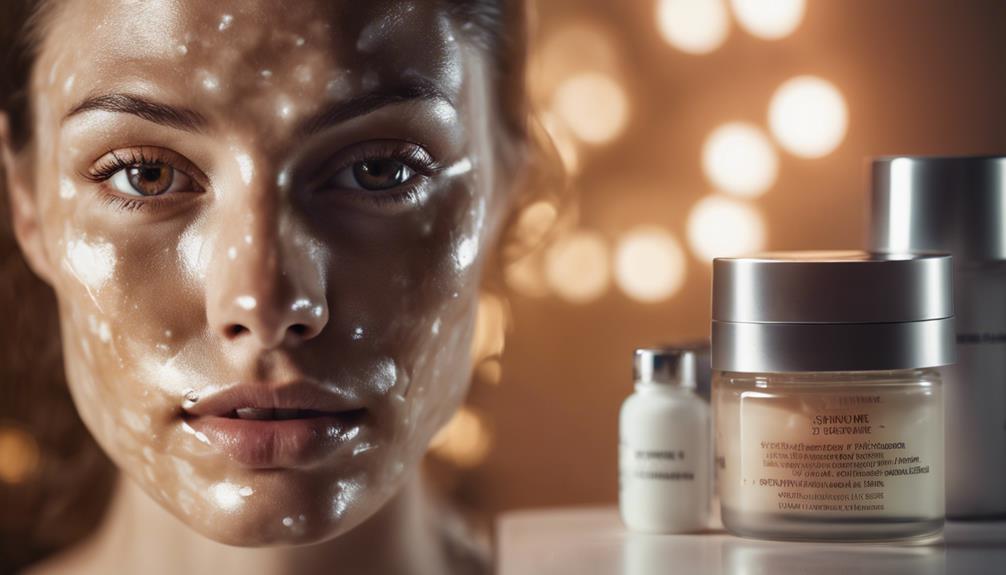You need to stop believing these skincare myths to improve your routine. First, drinking water doesn't directly hydrate your skin; it's about moisturizing products instead. Washing your face doesn't guarantee acne prevention, and spray tans offer no sun protection at all. Daily exfoliation isn't necessary; once or twice a week is better. Don't assume natural products are always safer, and higher SPF doesn't mean a longer sunblock life. Finally, hot water doesn't open pores. By learning the truth, you can better care for your skin and enhance your routine, so keep exploring for more insights!
Key Takeaways
- Drinking water alone does not hydrate the skin; effective hydration comes from a proper skincare routine with suitable moisturizers.
- Oily skin still requires moisturization to maintain a healthy barrier and prevent increased oil production.
- Daily exfoliation can damage the skin's protective barrier; aim for gentle exfoliation once or twice a week instead.
- Spray tans offer no UV protection; daily use of broad-spectrum sunscreen is essential regardless of the season.
Drinking Water Hydrates Skin
Many people believe that drinking water directly hydrates your skin, but that's not quite the case. While staying hydrated is essential for your overall health, the water you drink doesn't reach your skin's surface in a way that boosts skin hydration. Instead, hydration occurs at the cellular level, and your skin relies on its natural moisturizing factors to maintain moisture.
If you're experiencing dry skin, it's more likely due to environmental factors or a lack of effective moisturizers. To truly enhance your skin condition, consider using products with hyaluronic acid, which can help draw moisture from the environment into your skin. This is far more effective than just increasing your water intake alone.
Incorporating a solid skincare routine that includes gentle cleansers and suitable moisturizers is vital for ideal skin hydration. Don't forget that external factors like humidity also play a significant role in how hydrated your skin feels.
Washing Face Prevents Acne

You might think washing your face is the key to preventing acne, but it's more complicated than that.
While good hygiene matters, factors like oil production, bacteria, and even hormones play a significant role in breakouts.
Let's explore the misconceptions around cleanliness and discover effective skincare practices that truly help.
Acne Causes Explained
Washing your face isn't a foolproof way to prevent acne, as its causes often lie deeper than just skin cleanliness. While maintaining good skin hygiene is important, acne primarily results from excess oil, bacteria, and clogged pores.
Overwashing your face can actually strip away natural oils, leading to dryness and irritation, which may trigger your skin to produce even more oil and worsen the situation.
Instead of relying solely on frequent washing, focus on a balanced skincare routine. Gentle cleansing is essential for removing dirt without damaging your skin.
Follow up with moisturizing to maintain hydration and support your skin's barrier. It's also vital to recognize that hormonal fluctuations, stress, and certain medications can greatly impact acne development.
Hygiene Misconceptions Uncovered
Misunderstanding the role of hygiene in acne prevention can lead to ineffective skincare practices, including the belief that frequent face washing is the key to clear skin. Many people fall victim to hygiene misconceptions, thinking that the more they wash their face, the less acne they'll have.
In reality, your skin needs natural oils, or sebum, to protect itself against bacteria and environmental factors. Over-washing can strip your skin of these essential oils, causing dryness and potentially triggering increased oil production, which may worsen acne. It's vital to recognize that acne development is influenced more by hormones, bacteria, and clogged pores than by hygiene alone.
To keep your skin healthy, maintain a balanced washing routine. Experts recommend cleansing your face twice daily to avoid irritation while preserving the skin's natural barrier. Excessive washing may aggravate existing skin conditions, making moderation essential in your skincare practices.
Effective Skincare Practices
Cleansing your face effectively can play a crucial role in preventing acne and maintaining overall skin health. However, it's important to strike the right balance in your skincare routine.
Here are some key practices to keep in mind:
- Use a gentle cleanser specifically designed for your skin type.
- Wash your face twice a day to maintain skin balance without excessive washing.
- Follow up with a moisturizing product to hydrate your skin.
Spray Tan Offers Sun Protection

You might think that a spray tan offers some level of sun protection, but that's not the case. It only changes your skin color without shielding you from harmful UV rays.
Relying on a spray tan can create a misleading sense of safety, putting you at greater risk for sunburn and skin damage.
No UV Protection
Many people mistakenly think that spray tans provide sun protection, but they only change your skin color without shielding you from harmful UV rays. Relying on a spray tan can create a false sense of security, putting your skin health at risk.
Here are some key points to remember:
- Spray tans don't protect against UV damage; they're purely cosmetic.
- A darker skin color, whether from a spray tan or naturally, doesn't mean you're safe from sunburn.
- Believing that you're protected can lead to dangerous sun exposure.
It's vital to understand that UV damage can occur even if you're sporting a beautiful glow from a spray tan.
To maintain your skin health, you must incorporate a robust sun protection routine. This means applying broad-spectrum sunscreen every day, even when you feel confident in your tan.
Don't let the allure of a tan mislead you—always prioritize your skin's well-being over aesthetics. Embrace the glow, but don't forget the sunscreen!
Misleading Safety Perception
Believing that a spray tan provides sun protection can lead to dangerous misconceptions about skin safety. Spray tans may give your skin a beautiful glow, but they don't offer any UV protection. This misleading safety perception can cause you to skip essential sunscreen application while you're out in the sun.
Unlike natural tanning, which helps produce melanin to defend against UV damage, spray tans merely change your skin color without stimulating any protective response. By relying on spray tans, you might feel secure, but this false confidence can increase your risk of sunburn and long-term sun damage.
It's vital to understand that no matter how bronzed you look, you still need to prioritize your skincare routine by applying sunscreen whenever you're outdoors. For best skin health and to prevent skin cancer, make sunscreen a non-negotiable part of your routine.
Daily Exfoliation Is Essential

Daily exfoliation isn't necessary for healthy skin and can actually do more harm than good. Many people believe that scrubbing their skin every day will lead to a radiant complexion, but this misconception can result in damaging the skin instead.
Here are some reasons why you should reconsider daily exfoliation:
- It can disrupt your skin's protective barrier.
- Over-exfoliation may lead to redness and inflammation.
- Increased sensitivity can worsen existing skin issues.
Instead of harsh scrubs, focus on gentle exfoliants containing alpha-hydroxy acids (AHAs) or beta-hydroxy acids (BHAs). These ingredients help maintain healthy skin without the risks associated with daily exfoliation.
Moderation is key; too much exfoliation can compromise your skin's health, making it more prone to irritation and sensitivity.
Natural Products Are Safer

You might think that natural products are always safer for your skin, but that's not necessarily true.
Many natural ingredients can still cause irritation or even allergic reactions.
Instead of relying on labels, it's essential to research specific ingredients to guarantee their safety and effectiveness.
Natural Doesn't Mean Safe
Many people assume that natural skincare products are inherently safer, but this isn't always the case. Just because a product is labeled as natural doesn't mean it's free from harmful ingredients or adverse reactions. Here are a few facts to take into account:
- Natural ingredients can cause allergic reactions, like poison ivy, which might irritate your skin.
- The term 'natural' often lacks regulation, allowing harmful chemicals to sneak into products marketed as safe.
- Some natural preservatives aren't as effective as synthetic ones, leading to degraded products that can compromise safety.
Dermatologists consistently stress the importance of ingredient safety and efficacy, irrespective of their origin. Relying solely on the natural label can lead you to overlook potentially harmful components.
It's essential to scrutinize the actual ingredients in your skincare products. Always prioritize safety and effectiveness over marketing buzzwords to guarantee your skin stays healthy and happy.
Ingredient Safety Matters Most
Ingredient safety should always take precedence over the allure of natural labels, as even the most seemingly harmless products can harbor risks. Many natural products, like essential oils, can lead to skin irritation or allergic reactions, making it essential for you to scrutinize ingredients carefully. Just because a product is labeled 'natural' doesn't mean it's free from harmful substances.
The term 'natural' is largely unregulated, meaning the marketing claims you see on labels may not guarantee safety or efficacy. In fact, some synthetic ingredients, such as retinoids and hyaluronic acid, have undergone extensive studies and are proven to deliver significant skincare benefits without negative side effects.
Instead of focusing solely on whether a product is natural or synthetic, prioritize the specific safety and efficacy of each ingredient. Look beyond the marketing hype and evaluate what works best for your skin.
Oily Skin Doesn't Need Moisturizer

While it might seem counterintuitive, oily skin actually needs moisturizer to maintain a healthy balance and prevent overproduction of oil. Many people believe common skincare myths that suggest otherwise, but skipping moisturizer can lead to more skin problems down the line.
Here's why you should reconsider:
- Oily skin needs moisture to maintain a healthy moisture barrier.
- Using a moisturizer can actually help balance oil levels.
- Lightweight, non-comedogenic moisturizers help hydrate without clogging pores.
When you skip moisturizing, your skin may become dehydrated, prompting it to produce even more oil to compensate. This cycle can exacerbate existing skin problems like breakouts and irritation. A good moisturizer can help keep your complexion balanced and promote a more even skin tone.
Higher SPF Equals Better Protection

Higher SPF doesn't guarantee remarkably better protection against UV rays, so it's important to understand what those numbers really mean.
While it's tempting to think that using a higher SPF sunscreen offers considerably better defense, the reality is that SPF 30 blocks about 97% of UVB rays, and SPF 50 only increases that to around 98%. That's just a marginal difference.
Another common misconception is that a higher SPF allows you to stay in the sun longer without reapplying. No sunscreen can provide 100% protection, and factors like sweating, swimming, and towel drying can reduce its effectiveness.
To guarantee ideal protection, you need to apply and reapply sunscreen every two hours.
Hot Water Opens Pores

Many people believe that hot water opens pores, but this is a myth; pores can't actually open or close like doors, regardless of the temperature. Instead of helping your skin, using hot water can strip your skin of its natural oils, leading to dryness and irritation.
Here are some common misconceptions you might encounter:
- Hot water cleanses deeper than lukewarm water.
- Pores can be opened for better cleaning.
- Hot water is beneficial for all skin types.
In reality, exposing your skin to hot water can exacerbate skin conditions by causing inflammation and aggravating existing sensitivities.
Debunking these myths is essential for maintaining healthy skin. To protect your skin, it's best to use lukewarm water for cleansing. This temperature is gentle yet effective, allowing you to remove dirt without damaging your skin barrier.
Expensive Products Are Superior

Just because a skincare product comes with a hefty price tag doesn't mean it's more effective than budget-friendly options. In fact, many affordable products contain high-quality ingredients that can effectively help your skin.
It's crucial to understand that expensive products may contain harmful additives or fillers, while drugstore brands often focus on effective formulations without the high cost.
When evaluating skincare, focus on ingredient quality rather than price. You can find dermatologist-recommended ingredients like retinoids, vitamin C, and hyaluronic acid at various price points.
Celebrity endorsements and luxury branding don't guarantee superior quality or effectiveness. Instead, you should make informed choices by researching the ingredients and clinical evidence behind each product.
You Only Need Sunscreen in Summer

Relying on sunscreen only during the summer can leave your skin vulnerable to UV damage year-round. UV rays don't take a break, so it's vital to prioritize sunscreen every day. Here's why:
Up to 80% of UV rays can penetrate clouds, making overcast days just as dangerous.
UVA rays can reach you indoors through windows, so don't skip sunscreen even at home.
Using a broad-spectrum sunscreen with at least SPF 30 protects against both UVA and UVB rays year-round.
Consistent application helps prevent premature aging, discoloration, and skin cancer.
Even during the winter months, your skin needs protection. Snow can reflect UV rays, increasing exposure.
Daily use of sunscreen isn't just a summer routine; it's an indispensable step in your skincare regimen.
Protect your skin from damage by applying sunscreen every day, regardless of the season. This habit is key to maintaining healthy skin and warding off the long-term effects of sun exposure.
Don't underestimate the power of sunscreen—make it a non-negotiable part of your daily routine!
Frequently Asked Questions
Do We Really Need All This Skincare?
You don't need all that skincare. A simple routine—cleansing, moisturizing, and sunscreen—works for most people. Overloading on products can irritate your skin, so focus on what suits your needs best. Less is often more.
Which Skincare Mistakes Do You Think People Are Making Daily Without Realising?
You might think washing your face more will clear up acne, but it can backfire. Neglecting sunscreen daily, using hot water, or skipping moisturizer can all worsen your skin's condition without you even realizing it.
What Is a Random Fact About Skincare?
Did you know that all skin types, including oily skin, need moisturization? It's essential for maintaining a healthy moisture barrier. So, don't skip your moisturizer, no matter how oily you think your skin is!
Is It OK to Stop Using Skincare?
It's not okay to stop using skincare. Neglecting your routine can lead to dryness, irritation, and breakouts. Consistent cleansing and moisturizing protect your skin from environmental damage and maintain its overall health and appearance.
What Skincare Myths Might Lead to Premature Aging?
Believing in skincare myths can result in premature aging of the skin. Using “deadly household item aging skin” improperly can cause damage. Many think that sunscreens are only needed in the summer, but UV rays are harmful year-round. Using harsh products can also accelerate aging.
Conclusion
It's time to ditch these skincare myths that've been leading you astray!
Believing that water alone can hydrate your skin or that washing your face is a magical acne cure is like thinking a rubber duck can save you from a tidal wave!
Embrace the truth—your skin deserves better than these flimsy fables.
So, toss those misconceptions aside and release the radiant, healthy skin you've been dreaming of!
Your glow-up is just a myth-busting moment away!









